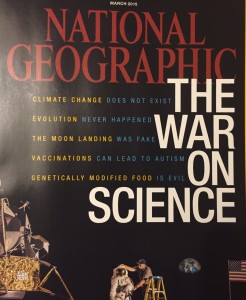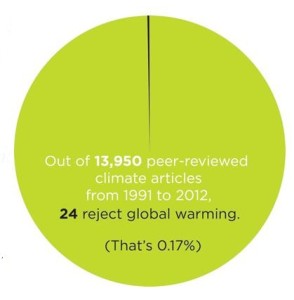Do I doubt the science of GMOs?
I received my National Geographic for March and I am entirely challenged by the cover. I find myself lumped in as a science denier due to my lack of support of GMOs! Am I arguing against fact and possibly even bringing risk to my society along the same lines as a climate deniers or an anti-vaccer? I went through some of my past research on GMOs and I assessed myself to see if I was judging without thought.
received my National Geographic for March and I am entirely challenged by the cover. I find myself lumped in as a science denier due to my lack of support of GMOs! Am I arguing against fact and possibly even bringing risk to my society along the same lines as a climate deniers or an anti-vaccer? I went through some of my past research on GMOs and I assessed myself to see if I was judging without thought.
First, I took a look at the “chapters” on the cover to do a sort of a gut check. Remember, my mission is to green-up buildings and to creatively solve problems without creating new ones.
- Climate change – Most of what can be done to address
 climate change is beneficial in many ways, including smart budget management and support of good health. Visible and measurable changes currently exist. Only .17% of scientific articles published from 1991-2012 in any way underplay the fact of climate change. Yup, real. Image from GPRO training by Urban Green (www.gpro.org)
climate change is beneficial in many ways, including smart budget management and support of good health. Visible and measurable changes currently exist. Only .17% of scientific articles published from 1991-2012 in any way underplay the fact of climate change. Yup, real. Image from GPRO training by Urban Green (www.gpro.org) - Evolution – Understanding the process of evolution helps us to see that what we do affects nature and development directly and long-term. There is a ton of evidence for evolution especially in the bio-record and in testing such as carbon dating. There are many ways to justify the storytelling of religion in relation to the science. Yup, real.
- Moon landing – So many inventions developed from the space program, so many people trained. Many attempts to prove fakery have failed. Vast conspiracies nearly never hold over time. And, uhh, why fake it? Yup, real.
- Vaccination – There is a real threat to society as a whole if people don’t get vaccinated, proven by past death rates from now preventable diseases. There is vast testing behind vaccines development and delivery. Anti-vaccine approaches lead to unmanageable societal risks as recent outbreaks of long-defeated diseases now show. Greater risk to individual if not vaccinated. All ties to autism totally debunked by science community. Yup, real and valuable.
- Genetically modified food – Highly tested, long term applications with no quantifiable downsides. Science says no risk if used. Increased production when used, ability to design foods with specific disease resistances. Yup, real…So why am I resisting? Hmmmmm
It is when I use the “creatively solve problems without creating new ones” lens that I get nervous about GMOs. They are an absolutely supportable technology on their own, but in practice I see more potential for risks that rewards. And the rewards are mostly for the typically large commercial farming enterprises, while the risks are shared over the entire food production industry. We also must be very careful, because we cannot undo what we do here.
The biggest risk is cross-pollination with non-GMO crops. Over time this will detrimentally affect the diversity and systemic strength of our food production industry and lead to monoculture situations for various crops. Corn and soy are well on their way to monoculture farming. History has proven that a monoculture approach is not wise regarding resisting disease, blight or the weather fluxes that can be tied to climate change. Unintentional cross-pollinating is prevalent enough that Monsanto has already sued heirloom tomato farmers for selling harvested tomato seeds that unfortunately now carry the GMO characteristics…the irony is that the heirloom farmer never wanted those GMO attributes anywhere near her own crop! BTW, Monsanto won the suit in mid-2014. Valuable movie lesson from Jurassic Park – nature will find a way.
Another risk, associated but not quite the same, is that the increased production supported by GMO crops will actually weight the market in favor of these larger industrial farms at a time when the organic crops and local farms are just beginning to gain traction. Again, this would only concern you if you recognize that diversity and small/local production is a strength in our food systems and in our business markets.
Maybe this next part is more gut on my part than science, but I wonder how we will be able to restrict our interventions. Is it right to modify to resist blight even if some richness of taste is sacrificed (we’ve actually seen that in traditionally developed “Delicious” apples). Who decides this? When does marketing value override nutrition value, I wonder? Genetically modifying in a lab can be significantly quicker than traditional grafting and selecting crops for strength. Some may argue that quicker results allows us more events for course correction, but I am concerned that the increased speed might not give us the time we need to process the goals and path we are taking.
The last aspect falls into the “do no harm” mentality, tied to the part about creating no new problems… we can do so much good to improve our food industry without resorting to genetic modifications. If we educate farmers in no-till and organic farming practices, reduce use of pesticides (that cause so much harm to water systems and human health) and increase use of integrated pest management approaches, composting and other integrative system nutrient and water practices, we will gain greater yields overall, cheaper, and without risking diversity.
So, do I “believe” the science of GMOs? I am not a science denier, and yes, I see the scientific care and respect the serious study of GMOs related to how they affect our health when we consume them. I do NOT, however, trust that enough has been studied about the effect of GMOs on our food industry. Until I know we are not undermining our local, organic and family farmers, or adversly affecting the vibrant diversity of the crops produced, I will do all I can to require GMO labeling on foods and to avoid GMO food purchases.
Jodi
Be the first to like this post (no login required)
